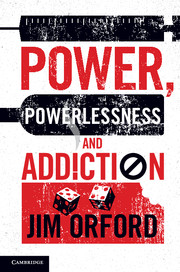Book contents
- Frontmatter
- Dedication
- Contents
- Preface
- Acknowledgements
- 1 Powerful connections
- 2 How addiction erodes free agency
- 3 Addiction subordinates the interests of family members and friends
- 4 Inequality in the power to resist addiction
- 5 Power and powerlessness in the addiction supply industries
- 6 Reasserting control and power in the process of change and treatment
- 7 Facing up to the power of addiction and those who benefit from it
- References
- Index
5 - Power and powerlessness in the addiction supply industries
Published online by Cambridge University Press: 05 July 2013
- Frontmatter
- Dedication
- Contents
- Preface
- Acknowledgements
- 1 Powerful connections
- 2 How addiction erodes free agency
- 3 Addiction subordinates the interests of family members and friends
- 4 Inequality in the power to resist addiction
- 5 Power and powerlessness in the addiction supply industries
- 6 Reasserting control and power in the process of change and treatment
- 7 Facing up to the power of addiction and those who benefit from it
- References
- Index
Summary
Beyond the immediate awareness of most people who suffer from addiction, there exists a vast network of people and organisations through whom the commodities to which people are addicted are supplied. David, Amanda, and Caroline, whom we met in Chapter 1, have only a very hazy understanding of the routes and means whereby the objects of their addictions are made available to them. Nor do their family members and friends, increasingly aware of how addiction undermines autonomy, know very much at all about how the substances or activities to which their relatives are addicted are produced, transported and marketed. Indeed, a telling aspect of their relatives’ powerlessness, and the powerlessness they as family members and friends experience at second-hand, is that the supply chain remains mostly beyond their horizon. David and his wife know little about the international drinks trade beyond their local pub. Amanda's parents, sister and friends are largely in the dark about the markets for illicit drugs, and even Amanda knows nothing beyond her immediate local suppliers. Likewise, Caroline, her daughter, her brother and her friends are largely ignorant of national policy debates about the regulation of gambling and certainly they know little about the gambling industry and how it operates. Caroline's brother has found out something about these things but he has had to work hard to uncover the information. The focus of the concern of these people, disempowered to one degree or another by alcohol, drugs or gambling, is much more local. If they hold anybody responsible for what has happened, it is likely to be themselves. Most people in their circumstances are far too taken up with their own affairs, which in the context of addiction are often confusing and disorganising, and are too inclined to apportion blame to themselves or to their relatives or family members or immediate circumstances to have the resources or motivation to investigate how the supply side works.
- Type
- Chapter
- Information
- Power, Powerlessness and Addiction , pp. 131 - 169Publisher: Cambridge University PressPrint publication year: 2013

